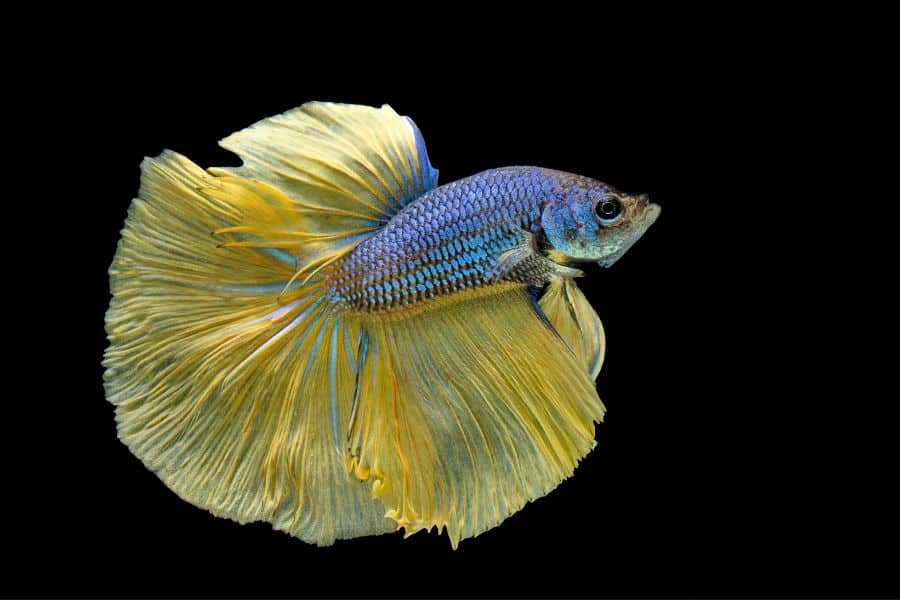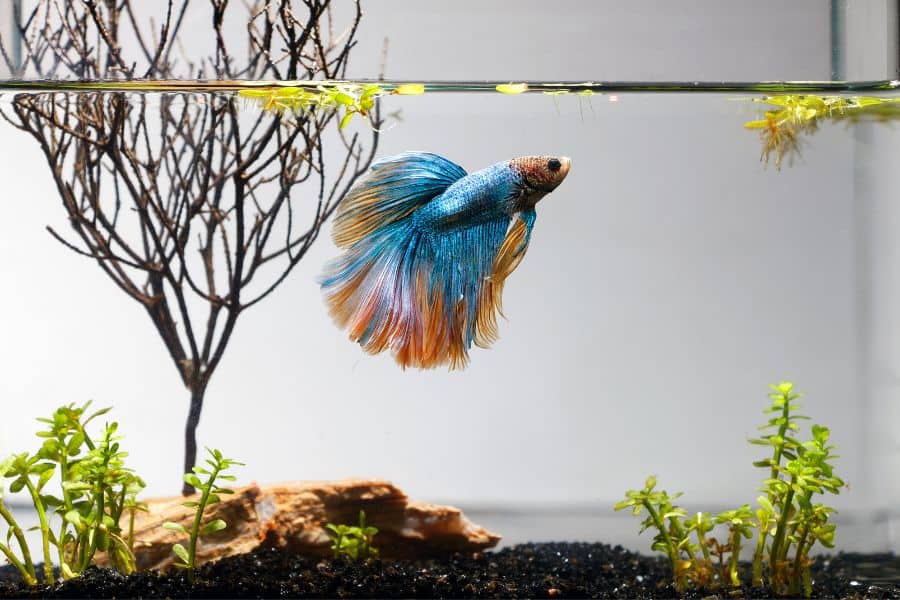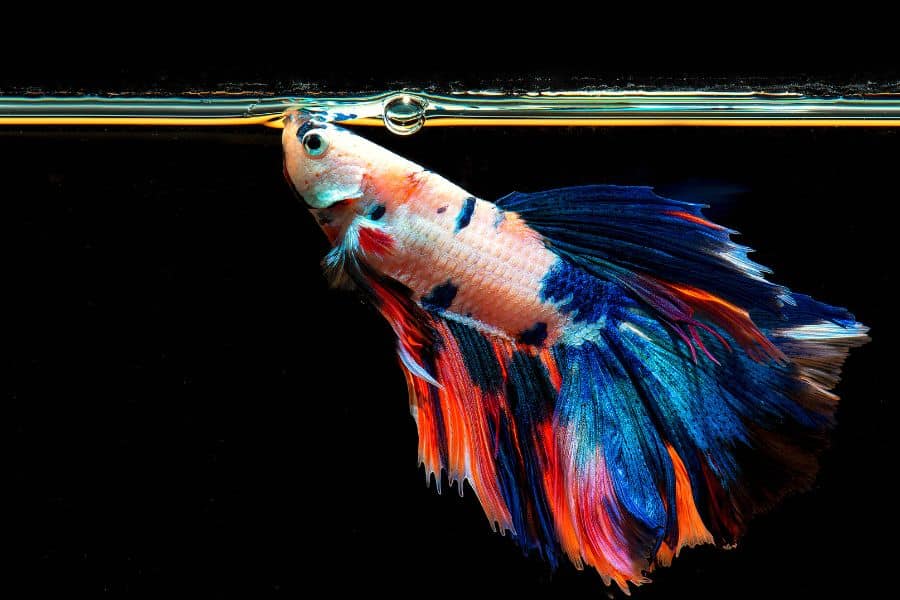Are you wondering how long Betta fish live? Owning a Betta fish can be a rewarding experience, but it’s essential to understand the basics, including their lifespan.
If you currently own or are considering purchasing one of these beautiful aquatic pets, then understanding the average Betta fish lifespan is key to giving them a healthy and happy life.
Here’s everything you need to know about how long your new finned friend will likely live and what factors might affect their overall longevity!
How Long Do Betta Fish Live?
Betta fish are known to live for about 2-5 years on average.
Wild Bettas tend to live shorter, mainly due to all the risks associated with the outside world. After all, not only do they have to fend for themselves, but they also have to battle predators, diseases, natural disasters, and other threats.
In captivity, however, Bettas that are well taken care of can live much longer. Of course, there’s no Guinness World Record for Betta fish since it would be pretty hard to provide paper proof.
That said, you’ll find many aquarium forums and communities talking about this topic. If these are to be believed, the Betta fish lifespan record is around 15 years. That’s amazing if true.
In general, though, you can consider a 6 to 8-year-old Betta fish to be quite elderly since the average Betta would not be expected to exceed five years.
Factors That Influence Betta Fish Lifespan
There are many factors that can influence the lifespan of a Betta fish. Here are some of the most common ones.
Tank Size
The size of the aquarium is important since Bettas need enough space to swim around. A Betta in a too-small tank can become stressed, which can lead to health issues and a shorter lifespan.
In fact, Bettas kept in 1-gallon bowls or even less may only live for one year before their health declines too much for them to survive.
A Betta fish should be kept in an aquarium of at least 5 gallons, although 10 gallons is the ideal minimum. Some passionate Betta fishkeepers even advocate keeping them in planted tanks of at least 20 gallons.
Additionally, Betta fish like to explore and hide in the aquarium, so adding plenty of live plants or caves is a great way to give them mental stimulation. This can be hard to do in a small tank, more so in a bowl.
Water Quality
The water quality in your Betta’s tank is another key factor. Although considered pretty hardy, Bettas are actually rather sensitive to the quality of the water they’re in.
Poor water quality can lead to infection and disease, which can lead to shorter Betta fish lifespans.
This is why it’s so important that you put a filter inside your Betta tank. Filters can help keep the water clean and aerated, which can go a long way in keeping your Betta healthy.
Environment
Environmental factors such as temperature control and light exposure are important, as well—too much heat or light can actually damage a Betta fish’s fins and scales.
Also, you may want to make your tank environment constant. If they’re constantly changing, it can also stress out the Betta.
For example, if your tank is in a room that has plenty of windows or doors, this could affect the lighting and temperature of your tank. The windows could be letting a lot of light in, or the doors opening and closing could be causing a draft.
Diet
A Betta’s diet is also important for its lifespan. Betta fish require a mainly carnivorous diet. They also need a variety of foods to ensure they’re getting all the vitamins and minerals they need. Pellets, live or frozen food, and flakes are some of the most popular Betta fish foods.
Make sure you avoid overfeeding Betta fish, as this can lead to obesity, which is associated with a shorter lifespan.
Gender
Male and female Bettas have the same average lifespan. There are no gender-specific conditions that will make one outlive the other.
However, if your Betta fish was store-bought, gender can come into play.
Male Betta fish takes longer to mature than female Bettas, so males in pet stores tend to be a little older than their female counterparts.
So, how old are Betta fish when you buy them? Female Bettas can typically be sold by 6-8 months of age, but most breeders will wait until the male is around one year old before they sell them. That’s because this is when their colors and fins will become more vibrant and attractive.
This means if you buy one male Betta and one female Betta from the same pet store at the same time, you can probably expect the female to outlive the male, as the latter is likely older anyway.
Tankmates
Betta fish are territorial creatures that don’t need tankmates to survive. However, if you do decide to add tankmates, it’s important to research the species thoroughly.
Incompatible tankmates can cause Bettas to become stressed and over-aggressive, which reduces their lifespan. It’s best to add tankmates that are peaceful, non-aggressive fish of similar size. You can also add invertebrates such as snails or shrimp.
Maintenance and Care
Other factors, such as how often you clean the tank, can also affect the length of a Betta fish’s life. Regular maintenance and water changes are essential to the Betta’s health.
Betta fish that receive proper care and attention tend to live longer than those kept in neglected tanks.
What You Can Do To Increase Your Betta Fish’s Lifespan
The good thing is that with the right care, you can greatly increase your Betta fish’s lifespan. Here are some easy tips to get you started.
- Choose the right tank size. Make sure your Betta fish is in a tank of at least 5 gallons, with 10 gallons being ideal. Giving your Betta plenty of room to explore can increase activity levels, leading to healthier longevity.
- Set the right temperature. Remember that temperatures can make a big difference. Betta fish prefer warm water and typically don’t do well in water that is cooler than 74°F (23°C).
- Make them feel safe. Place plenty of high-quality decoration in the tank to allow your fish some hiding places and spots to explore.
- Prioritize their nutrition. Be sure to feed high-quality food two or three times daily, as malnutrition can cause premature death. Their diet should be varied, consisting of high-quality pellets, frozen or live food, and flakes. Don’t overfeed your Betta, though, since excess food can lead to fin and skin problems and create an unhealthy environment for them.
- Do regular maintenance. Perform regular water changes at least once a week or more, depending on the size of your tank. This will help keep toxins from building up and harming your fish. Also, always use a water conditioner to ensure the water is free from anything harmful that untreated water may contain.
- Cover the top. Betta fish can jump, and if the tank isn’t covered, they may try to escape. Make sure the top of your Betta tank is securely covered with a Betta-safe lid. If you don’t like covers or can’t find one that suits your tank, you can also add some floating plants, as these can stop your Betta from jumping out.
These practices should result in a happier, healthier Betta who is likely to live longer than its counterparts who don’t get these same privileges!
Related:
- Betta Fish Tank Setup: What to Put In?
- How Long Do Different Cichlid Species Live?
- How Long Do Mollies Live?
- Common Betta Fish Behaviors Before Death
- Why Your Betta Fish Is Not Eating
FAQs
What’s the Average Betta Fish Lifespan in The Wild?
Wild Betta fish can survive for up to 2-4 years, but they usually only live for about two years. Keep in mind that it’s a harsh world out there, and Bettas face many dangers and illnesses.
What’s the Average Betta Fish Lifespan in A Tank?
Captive Bettas tend to have longer lifespans than their wild counterparts. In a tank, the Betta can survive in a regulated environment with no predators or lack of food. If taken care of properly, pet Bettas can easily exceed their species’ average lifespan.
What’s the Average Betta Fish Lifespan in A Bowl?
Betta fish in bowls typically don’t do as well as Bettas in bigger tanks. There are many issues with small bowls, especially those that are 1 gallon or less.
For instance, it’s harder to regulate the water quality in a small bowl since every little change can have a huge impact. As such, the Betta’s lifespan in a bowl is usually shorter than if it were kept in a larger tank.
Why Did My Betta Fish Die so Easily?
There are many reasons why a Betta fish could die quickly, such as poor water quality, lack of food, or parasitic infection.
If your Betta died prematurely, it’s best to review the care that you provided it with. Check if the water quality was up to par, the tank was the right size, and the Betta had a varied diet.
However, if you had done all this and the Betta still died, it’s important to keep in mind that it wasn’t your fault. It’s normal for Bettas to die before even two years old – it could be genetics or simply bad luck.
What’s the Average Betta Fish Lifespan Depending on Gender?
The gender of a Betta fish doesn’t affect its lifespan, but if you bought yours from a pet store, it could explain why they died sooner than expected, particularly if they’re male.
Male Bettas are sold at a later point in their lives than female Betta fish, which means that your store-bought male Betta was probably already 1-year-old or even older when you got it.
What’s the Betta Fish Lifespan Record?
There are no official records for Betta fish lifespans. However, according to online forums, there are Bettas that have made it to 10, 12, and even 15 years.
Conclusion
Caring for your Betta fish and creating a happy, healthy environment are essential aspects of enabling them to live their fullest lives.
From the proper tank setup and diet to regular maintenance, there’s a lot you need to know when it comes to how long Betta fish live.
After all, with all the joy they bring us while they swim around in our tanks, it’s worth taking the time and effort to give them a chance at living as long as possible.
By understanding their nutritional needs, providing them with ample space, and giving them the care they deserve, you can make sure that your beloved Betta fish will thrive for many years ahead!


